|
|
|
Sort Order |
|
|
|
Items / Page
|
|
|
|
|
|
|
| Srl | Item |
| 1 |
ID:
146645
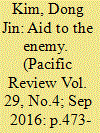

|
|
|
|
|
| Summary/Abstract |
This article discusses the link between development and peacebuilding to analyze South Korean aid activities in North Korea in the context of the Korean conflict, where there are deep-rooted cycles of conflict episodes, and to explore the possibility of aid for peace on the Korean peninsula in the future. The Korean conflict is a large part of what makes South Korean aid to North Korea ineffective. For the past 20 years, South Korean aid to North Korea has fluctuated greatly, due to the context of the Korean conflict. The Korean conflict, once seemingly on the way to resolution, appears to have reverted to a time before the end of the Cold War. Many people in both the North and the South still see each other as the enemy. Most of the South Korean aid projects in North Korea have been suspended indefinitely and the fluctuation of aid to North Korea caused serious debates within South Korean society. At one point, the debates grew so heated that they were called the ‘South–South conflict’. Building on the conceptual framework of conflict sensitive development and strategic peacebuilding, this article argues that, to overcome the current impasse, all stakeholders must better understand the context of the Korean conflict and the interaction between the context and themselves, and develop a comprehensive strategy together, to encompass the multiple issues raised by the Korean conflict, as strategic peacebuilding proposes.
|
|
|
|
|
|
|
|
|
|
|
|
|
|
|
|
| 2 |
ID:
146648
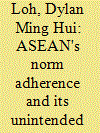

|
|
|
|
|
| Summary/Abstract |
This paper examines the effects and expressions of norm compliance in Association of Southeast Asian Nations (ASEAN) and the ‘unintended consequences’ arising from such compliance. This is done through an analysis of ASEAN's responses in humanitarian assistance and disaster relief (HADR) efforts in the Typhoon Haiyan disaster and in the search for missing flight MH370. It argues that the lethargic ASEAN responses in the Haiyan disaster and the uncoordinated search efforts for missing flight MH370 are unintended outcomes arising from norm adherence specifically to the norms of ‘respect for sovereignty’ and ‘consensual decision-making’ which constrained the range of ASEAN responses.
|
|
|
|
|
|
|
|
|
|
|
|
|
|
|
|
| 3 |
ID:
146647


|
|
|
|
|
| Summary/Abstract |
Through the selective allocation of attention, framing and metaphors in covering foreign affairs and countries, media narratives often act to delegitimise, marginalise and demonise international actors. Focusing on Australian reportage of North Korea in The Australian, The Sydney Morning Herald and from the Australian Broadcasting Corporation (ABC) between 1 January 2010 and 31 December 2012, this paper explicates how the framing mechanisms utilised in media point to media complicity in reinforcing a negative, adversarial orientation towards North Korea. It also discusses implications for how Australians view the North Korean people, Australian–North Korean relations, and policy pertaining to Northeast Asia more broadly.
|
|
|
|
|
|
|
|
|
|
|
|
|
|
|
|
| 4 |
ID:
146649
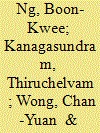

|
|
|
|
|
| Summary/Abstract |
In the past, studies on inclusive development involve mainly the perspective of equitable distribution of economic and societal outputs. This study, however, takes a different approach and analyses the potential roles of regional coordination mechanisms (RCMs), specifically universities and research council's networks within Southeast Asia, in disseminating the innovation-related activities for inclusive development or Innovation for Inclusive Development (IID). The literature on innovation intermediaries within the realm of innovation systems studies was used to establish the framework of the study. The findings indicate that RCMs have a huge potential role to play. However, due to a number of reasons, including lack of funding support, lack of attention and commitment to IID, weak engagement with industry and non-governmental organisations, the implementation of the IID activities was rather poor. As a whole, the study argues that current approaches are not well positioned and it is fragmented preventing the effective use of RCMs despite their potentials for IID efforts. The study attributes this to the systemic failures in the regional coordinating systems. In enhancing the role of RCMs in IID, this study recommends the promotion of IID platform, the leveraging of non-government organisations and industry as well as energising the Southeast Asia engagement in promoting IID.
|
|
|
|
|
|
|
|
|
|
|
|
|
|
|
|
| 5 |
ID:
146650
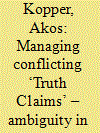

|
|
|
|
|
| Summary/Abstract |
The article is a study of managing interstate relations via ambiguity and secrecy. At the focal point of the article is the different constitutive logic of domestic politics and diplomacy in conceiving and managing social reality; with the former implying the notion of community and the latter separateness – the difference that allows for diplomatic conduct to rely on tacit agreements and ambiguity for managing contradictory ‘truth claims’, as China and Japan did in the case of the Ryukyu and later the Senkaku Islands. Such successful management is conditional on the parties' ability to control domestic narratives avoiding contradictions in their ‘truth claims’ becoming too blatant. Yet, modern technologies increasingly undermine states' capacities for this. The leaking on YouTube of the collision of a Chinese trawler with the ship of the Japanese Coast Guard in 2010 offers a perfect example. The incident aggravated the conflict and triggered intense debates on secrecy in Japan. The article concludes by arguing that once ambiguity and tacit agreements break down, leaders should turn to their public – recognize that noisy nationalist are frequently but a minority – and attempt to renegotiate ‘truth claims’ domestically to create the basis for a compromise.
|
|
|
|
|
|
|
|
|
|
|
|
|
|
|
|
| 6 |
ID:
146646
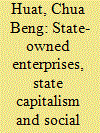

|
|
|
|
|
| Summary/Abstract |
State-owned enterprises and sovereign wealth funds have ‘insured’ Singapore's domestic economy against financial crisis and restructuring interventions from multilateral institutions, engendered elite cohesion and political stability, binding middle class employees to the political system. This essay analyses paths by which the Singapore government established state-owned enterprises and transformed them into global enterprises. It also examines how sovereign wealth funds contribute to government social expenditure without increasing taxes. Such redistribution through state capitalism resonates with the People's Action Partys social democratic origins, inviting comparisons with contemporary developments in Chinese state-capitalism.
|
|
|
|
|
|
|
|
|
|
|
|
|
|
|
|
| 7 |
ID:
146651


|
|
|
|
|
| Summary/Abstract |
Corruption remains one of the key obstacles to democratization and good governance. Given the nature of the subject, corruption is notoriously difficult to study. International comparisons and rankings of good governance such as the World Bank World Governance Indicators, the Bertelsmann Sustainable Governance Index, or Transparency International's Global Corruption Index are very useful for providing the big picture on corruption. To understand trends and mechanisms of corruption, however, it is necessary to conduct case studies on both successful and failed cases of anti-corruption policies. This paper investigates the successes and challenges of the fight against corruption in South Korea since the beginning of democratization in 1987. The investigation shows that Korea has generally been successful in controlling corruption. The paper argues that the remaining problems can be largely explained by the legacy of authoritarian rule and the undermining of state autonomy through the concentration of economic power.
|
|
|
|
|
|
|
|
|
|
|
|
|
|
|
|
|
|
|
|
|